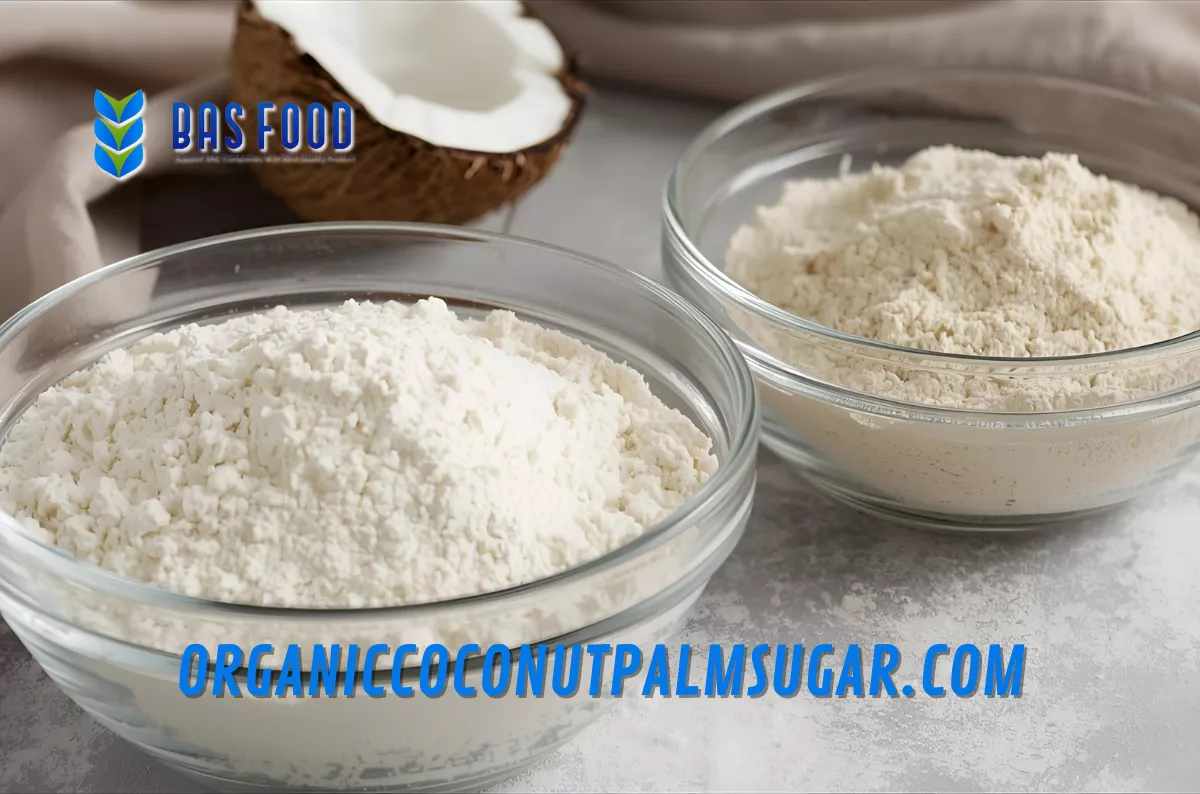For decades, wheat flour has been the go-to ingredient in baking, from bread and pasta to pastries and pancakes. But as more people look for healthier, gluten-free alternatives, coconut flour has emerged as a favorite choice among health-conscious eaters. When comparing coconut flour vs wheat flour, it’s important to consider the differences in texture and nutritional benefits.
So, what exactly makes this comparison between coconut flour vs wheat flour so interesting? It’s more than just about baking—it’s about understanding how these two flours impact your body, your diet, and even your lifestyle.
Wheat flour, made from ground wheat grains, is high in carbohydrates and gluten, which gives bread its chewy texture. Meanwhile, coconut flour is made from dried coconut meat, offering a low-carb flour option that’s rich in fiber, protein, and healthy fats.

What Is Coconut Flour?
Coconut flour is a soft, fine powder made by drying and grinding the meat of mature coconuts. It’s a by-product of coconut milk extraction, meaning it makes full use of the coconut fruit without waste. This flour has a light aroma and a mild coconut flavor, making it perfect for both sweet and savory recipes.
Unlike traditional flour, coconut flour is naturally gluten-free, making it an excellent gluten-free alternative for people with celiac disease or gluten intolerance. It also contains fewer carbohydrates than wheat flour, which is why it’s popular among those following keto or paleo diets.
In addition to being low in carbs, coconut flour boasts impressive nutritional benefits. It’s high in dietary fiber, which supports digestion and helps maintain steady blood sugar levels. Because it absorbs a lot of moisture, recipes using coconut flour typically need more liquid or eggs to achieve the right texture.
What Is Wheat Flour?
Wheat flour has been a staple food for centuries and is made by grinding wheat kernels into a fine powder. Depending on the part of the grain used, there are several types—such as whole wheat, all-purpose, and refined white flour.
Wheat flour is high in carbohydrates and contains gluten, a protein that helps dough stretch and rise. This property makes it ideal for bread, pizza, and other baked goods that need elasticity and chewiness. However, the same gluten that makes bread fluffy can cause digestive discomfort in some people.
Nutritionally, wheat flour offers vitamins like folate and minerals such as iron and magnesium. However, refined white flour loses much of its fiber and nutrients during processing, making it less healthy than whole wheat or other natural alternatives.
Nutritional Comparison: Coconut Flour vs Wheat Flour
When it comes to coconut flour nutrition, the numbers speak for themselves. On average, 100 grams of coconut flour contains about 400 calories, 60 grams of fiber, 20 grams of carbohydrates, 18 grams of protein, and 12 grams of healthy fats. In contrast, 100 grams of wheat flour provides around 364 calories, 73 grams of carbohydrates, 10 grams of protein, and just 2 grams of fiber.
This means coconut flour is not only lower in carbs but also significantly higher in fiber and protein. The high fiber content helps you feel full for longer, supports gut health, and stabilizes blood sugar. Meanwhile, wheat flour’s higher carb content can cause faster spikes in blood glucose levels.
From a macronutrient perspective, coconut flour wins in terms of low-carb and high-fiber benefits, while wheat flour provides a better structure for baking due to its gluten content. So, depending on your health goals, the “healthier” option may vary.
Health Benefits of Coconut Flour
One of the biggest reasons people switch to coconut flour is its health profile. This low-carb flour is naturally rich in fiber, which promotes digestive health and helps regulate blood sugar. The healthy fats in coconut flour—mainly medium-chain triglycerides (MCTs)—support metabolism and can provide a quick source of energy.
Coconut flour is also a gluten-free alternative, ideal for those who suffer from gluten sensitivity or celiac disease. It’s packed with lauric acid, a compound known for its antibacterial and antiviral properties. These nutrients make coconut flour more than just a baking ingredient—it’s a wholesome food that nourishes your body.
Additionally, using coconut flour can help in weight management. Because it’s high in fiber, you feel full faster and eat less overall. This makes it a smart choice for people trying to manage calorie intake without sacrificing taste or texture in baked goods.
Health Considerations of Wheat Flour
While wheat flour is widely used, not all types are equally healthy. Whole wheat flour still contains the bran and germ, which means it offers more fiber and nutrients than refined flour. However, many people today rely heavily on white flour, which is stripped of its natural fiber and vitamins.
Refined wheat flour can cause rapid spikes in blood sugar levels and may contribute to weight gain if consumed in large quantities. It’s also a source of gluten, which some people find difficult to digest. Symptoms like bloating, fatigue, or stomach discomfort after eating wheat-based foods could indicate gluten sensitivity.
That said, wheat flour still provides energy and certain essential nutrients. For individuals without gluten issues, moderate consumption of whole wheat flour can be part of a balanced diet. The key lies in choosing the right type of wheat flour and consuming it mindfully.
Baking with Coconut Flour vs Wheat Flour
Baking with coconut flour requires a different approach than baking with wheat flour. Because coconut flour absorbs much more liquid, you can’t substitute it in a 1:1 ratio. Typically, you’ll need about one-fourth of the amount of coconut flour compared to wheat flour, and extra eggs or liquid to maintain moisture.
The result, however, is worth it. Coconut flour gives baked goods a light texture with a subtle sweetness. It works wonderfully in pancakes, muffins, cookies, and even gluten-free bread.
Wheat flour, on the other hand, provides a familiar texture and rise due to its gluten content. It’s more forgiving for most recipes, making it ideal for traditional bread and pastries. So, if you’re experimenting with coconut flour for the first time, start with recipes specifically designed for it.
Which Flour Fits Your Diet Best?
Your choice between coconut flour vs wheat flour depends largely on your dietary needs and preferences. If you’re following a low-carb or gluten-free diet, coconut flour is clearly the better option. It supports blood sugar control, aids digestion, and aligns well with paleo, keto, or diabetic-friendly diets.
However, if you don’t have gluten intolerance and prefer baking with ease and structure, wheat flour still has its place in the kitchen. It’s especially good for bread and pastry recipes that rely on gluten for texture and elasticity.
Ultimately, balance is key. You can even combine the two—using some coconut flour to increase fiber and reduce carbs while keeping part of the wheat flour for structure and consistency.
The Role of Sustainable Coconut Products
As the demand for coconut flour and other coconut-based products rises, sustainability becomes an important factor. Responsible coconut sourcing ensures that the environment and local communities benefit from production.
In Indonesia, companies like CV Bonafide Anugerah Sentosa play a key role in this. As a trusted spices supplier and coconut supplier, the company provides high-quality coconut derivatives—including coconut flour, coconut sugar, and coconut oil—for export. Their commitment to sustainability and quality makes them a reliable partner for businesses seeking ethically sourced ingredients from Indonesia.
By supporting suppliers like CV Bonafide Anugerah Sentosa, global buyers contribute to eco-friendly agricultural practices while accessing premium natural products for their industries.
Final Thoughts: The Healthier Choice for You
When comparing coconut flour vs wheat flour, it’s clear that both have their unique strengths. Coconut flour stands out as a low-carb flour and gluten-free alternative, packed with fiber, protein, and healthy fats. Wheat flour, meanwhile, remains a classic for its baking performance and familiar texture.
If your goal is better digestion, stable energy, and reduced carb intake, coconut flour is the winner. If you’re looking for elasticity and traditional baking results, wheat flour is still dependable.
In the end, the healthiest choice is the one that fits your body and your goals. Whether you’re baking keto muffins or traditional bread, understanding what’s in your flour helps you make smarter decisions for your health.
Contact CV Bonafide Anugerah Sentosa how we can provide the best solutions for you. WhatsApp: +62 8213 4505 737, Email: info@bonafideanugerahsentosa.com / bas.mdir@gmail.com.

